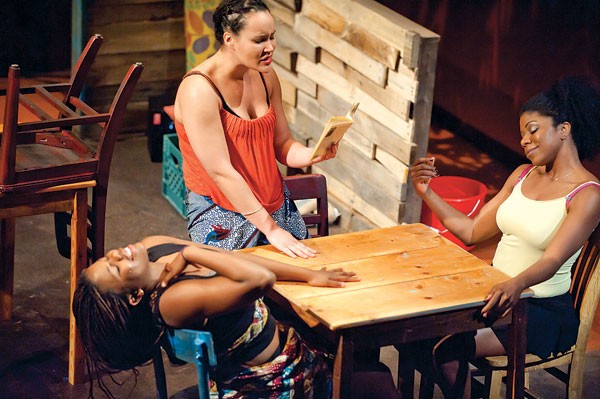Ruined
![]()
![]()
![]()
![]()
![]()
Burning Coal Theatre Company
At Murphey School Auditorium
Through April 28

The truth is undisputed and unconscionable: In conflicts spanning the globe, mass rape has been and is being used as a tool of war. A tribunal found that rape camps were constructed as an “instrument of terror” during the Bosnian conflict in the early 1990s. According the United Nations, at least a quarter of a million Tutsi women were raped during the 1994 Rwandan genocide.
More recently, the Women Under Siege project reported last week that a “massive rape crisis” is unfolding in the Syrian civil war, even as G8 leaders signed a declaration establishing rape and sexual violence as war crimes under the Geneva Conventions. Last Friday, under mounting pressure from the U.N., 12 senior officers in the Democratic Republic of the Congo were charged in the mass rape of hundreds of women by government troops in the eastern town of Minova last November. Soldiers there reported being ordered to attack the village’s women; one soldier confessed last week to raping 53 women and children.
These sickening reports provide the latest examples of a wartime behavior dating back to prehistory. Audiences who are urged to see this powerful, disturbing production of Ruined at Burning Coal Theatre need not complain about the show’s intensity, which built to a near fever pitch under Rebecca Holderness’ direction last Friday night.
In focusing on proprietor Mama Nadi and the three women who staff her hardscrabble bar and brothel outside an eastern Congo mining village, playwright Lynn Nottage has given us a glimpse from the outer edges of a holocaust. As bad as it gets in Ruinedand it does get badit is all the more chilling to note that, for women in this conflict zone, the scenario explored here mostly represents some of the more benign outcomes. For far too many in what I’ll call the original cast, the results wereand are far, far worse.
Through little more than force of will, razor-sharp negotiating skills, personal charm and the semi-dependable supply of black-market items she gets from Christian (a winning Byron Jennings), Mama Nadi (the captivating Rozlyn Sorrell) has staked out a provisional sanctuary on disputed territory. The bar and brothel she operates occupies an area being claimed by both rebel and government militia. In her joint’s back rooms, where the sex that’s coerced at gunpoint elsewhere is handled as commerce, there’s at least a semblance of equity and control.
But with the volatile mix of booze, live munitions, post-traumatic stress and military monomania the soldiers bring with them into the bar, any control of the situation remains provisional at best. The outbursts of Joseph Reese’s volatile warrior remind us of the tightrope Mama constantly walks with her staff: the stuck-up Josephine (Sherida McMullan) and refugees Salima (Madelynn Poulson) and Sophie (Reanna Roane). Matters further destabilize as militia leaders on both sidesCommander Osembenga (a truly menacing Byrd Wilkins) and rebel Joseph Kisembe (Savada Gilmore, underdeveloped on Friday night)wonder more and more if Mama Nadi’s place is a stronghold for the opposition.
Under Holderness’ direction, this production features a number of riveting monologues, particularly in the second act. Poulson’s performance, recounting Salima’s forcible departure from her village, caused audible gasps in the audience, erasing any early questions I had about her character’s focus. Roane’s Sophie is not the songbird Nottage describes in her script (those duties largely fell to McMullan), but her accounts of the things her character is running fromand towardwere ultimately compelling.
In addition to the strong supporting artists above, John Allore stood out as Mr. Hariri, the perpetually nervous foreign trader, and Gil Faison convinced as Fortune, a farmer impressed into a militia. Four striking paintings of Kenyan actors by designer Morag Charlton overlook the ramshackle set of second-hand lumber, table and chairs. The quartet suggests modern-day orishas who witness and challenge the events on stage, and the audience as well. Last weekend’s weakest component was the anemic ensemble performances of Jonathan Fitts’ too-brief, Afropop-tinged score.
Ruined depictsgraphically, at pointsthe human price of waging war on women’s bodies. Having seen it, how can we ever look away?
This article appeared in print with the headline “Gimme shelter.”


